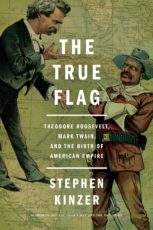In this episode, host Mitch Jeserich speaks with Stephen Kinzer, an award-winning foreign correspondent. He served as The New York Times’s bureau chief in Turkey, Germany, and Nicaragua and as The Boston Globe’s Latin America correspondent. He is a senior fellow at the Watson Institute for International and Public Affairs at Brown University and writes a column on world affairs for The Boston Globe. His latest book is The True Flag: Theodore Roosevelt, Mark Twain, and the Birth of American Empire.
About The True Flag
 Stephen Kinzer spotlights the domestic discord and clamor over America’s imperial ventures at the dawn of the 20th century. After a century of continental expansion, the U.S. encountered the opportunity to expand overseas by capturing Spanish colonial possessions and other territories and peoples within its reach. The nation plunged into arguably “the farthest-reaching debate” in its history with political and intellectual giants contesting “the imperial idea” to determine America’s place in the world and in history. Expansionists proclaimed benevolent intent and a civilizing mission while touting the economic benefits of conquest; anti-imperialists recalled America’s anticolonial origins and condemned imperialist violence and brutality. The former largely triumphed, as the U.S. soon controlled Cuba and annexed Puerto Rico, Guam, Hawaii, and the Philippines in a swift series of subjugations. In Kinzer’s gripping narrative, the egotistical Theodore Roosevelt emerges in his aggressively hypermasculine fashion as the most outspoken expansionist, while Mark Twain embarks on the “least-known phase of his career” to resist the violent drive toward empire. Kinzer ably conveys the passion and ferment of this brief period, situating this grand debate in the context of U.S. foreign policy history and convincingly arguing that the imperial/anti-imperial dichotomy remains a dominant feature of the American psyche.
Stephen Kinzer spotlights the domestic discord and clamor over America’s imperial ventures at the dawn of the 20th century. After a century of continental expansion, the U.S. encountered the opportunity to expand overseas by capturing Spanish colonial possessions and other territories and peoples within its reach. The nation plunged into arguably “the farthest-reaching debate” in its history with political and intellectual giants contesting “the imperial idea” to determine America’s place in the world and in history. Expansionists proclaimed benevolent intent and a civilizing mission while touting the economic benefits of conquest; anti-imperialists recalled America’s anticolonial origins and condemned imperialist violence and brutality. The former largely triumphed, as the U.S. soon controlled Cuba and annexed Puerto Rico, Guam, Hawaii, and the Philippines in a swift series of subjugations. In Kinzer’s gripping narrative, the egotistical Theodore Roosevelt emerges in his aggressively hypermasculine fashion as the most outspoken expansionist, while Mark Twain embarks on the “least-known phase of his career” to resist the violent drive toward empire. Kinzer ably conveys the passion and ferment of this brief period, situating this grand debate in the context of U.S. foreign policy history and convincingly arguing that the imperial/anti-imperial dichotomy remains a dominant feature of the American psyche.

